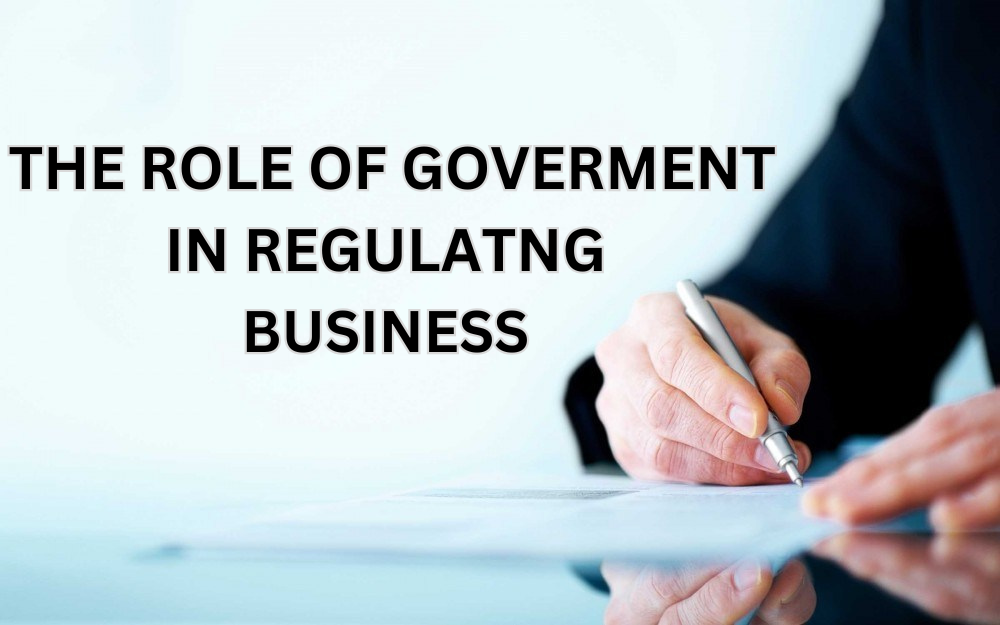Governments play a crucial role in regulating businesses to ensure fairness, protect consumers and promote economic stability by setting rules and guidelines they create a level playing field where businesses can compete ethically and responsibly regulations help prevent harmful practices such as fraud exploitation and environmental damage safeguarding public interests and resources government oversight encourages transparency and accountability fostering trust between businesses and society through policies like taxation labor laws and environmental standards governments balance economic growth with social welfare these measures not only protect workers and consumers but also ensure sustainable development.
While some argue that too much regulation stifles innovation and competitiveness the right balance can spur businesses to improve their practices and adapt to changing market needs regulation is essential for maintaining order in the marketplace and addressing the challenges that arise from rapid industrial and technological advancements by enforcing fair practices and ensuring compliance governments help create a stable environment where businesses can thrive without compromising the well-being of people or the planet this balance between freedom and oversight is vital for long-term economic and social progress.
Reason for Government Regulation:
Government regulation is necessary to ensure fairness safety and stability in society and the economy without rules businesses might prioritize profits over ethical practices leading to problems like exploitation of workers unsafe products or environmental damage regulations help protect consumers by ensuring that goods and services meet quality and safety standards they also safeguard employees by setting fair labor practices including minimum wages safe working conditions and protection against discrimination regulations prevent monopolies and encourage healthy competition ensuring no single company can dominate the market unfairly another reason for regulation is to address market failures such as pollution
Environmental laws for instance help reduce harm to ecosystems and promote sustainable practices financial regulations prevent risky behaviors that could lead to economic crises protecting both businesses and consumers while some argue that excessive regulation can limit innovation or increase costs well-designed regulations strike a balance ensuring businesses operate responsibly without stifling growth government oversight builds trust between businesses consumers and society by creating a fair and transparent system that benefits everyone.
Types of Government Regulation:
Government regulations can be categorized into different types each serving a specific purpose to maintain order fairness and safety in society one common type is economic regulation rules to prevent monopolies regulating utilities like electricity and water and ensuring fair pricing for consumers economic regulations help create a competitive market where businesses can thrive without exploiting consumers or small competitors another important type is social regulation which aims to protect public welfare by addressing health safety and environmental concerns instance food and drug safety laws ensure that products are safe for consumption.
While environmental regulations limit pollution and encourage sustainable practices workplace safety laws protect employees from hazardous conditions ensuring fair treatment and well-being involves setting operational standards for businesses such as licensing requirements tax laws and compliance reporting these rules ensure businesses follow proper procedures and contribute to national development through taxes and accountability focuses on the banking and financial sectors to maintain stability and prevent crises it includes monitoring banks ensuring ethical investment practices and protecting consumers from fraud.
Regulatory Agencies:
Regulatory agencies are specialized government bodies responsible for enforcing laws and overseeing specific industries or sectors to ensure compliance with established rules these agencies play a crucial role in protecting public interests by monitoring businesses addressing violations and promoting fair practices for example agencies like the Food and Drug administration (FDA) ensure that food medicine and medical devices are safe for consumers while the environmental Protection Agency (EPA) enforces environmental laws to protect natural resources and reduce pollution financial regulatory agencies such as central banks or securities commissions.
Agencies also regulate communication and technology sectors ensuring data privacy and ethical practices in the rapidly evolving digital landscape by setting industry standards conducting inspections and issuing penalties for non-compliance, regulatory agencies act as watchdogs balancing the interests of businesses and the public while their rules may sometimes seem strict these agencies are essential for fostering trust ensuring accountability and safeguarding the well-being of individuals communities and the environment.
Over Regulation:
When government rules and restrictions become excessive, making it difficult for businesses to operate efficiently while regulations are essential for ensuring fairness safety and stability too many or overly complex rules can create unnecessary burdens businesses may face high compliance costs increased paperwork and delays in processes which can limit their ability to innovate or expand small businesses in particular often struggle with over-regulation because they lack the resources to meet the same standards as larger over-regulation can also stifle competition by creating barriers for new businesses to enter the market for example if licensing requirements or fees are too strict startups may find it nearly impossible to compete with established excessive rules can discourage investment as investors may see the regulatory as unpredictable or too restrictive.
In some cases over-regulation can lead to inefficiencies where businesses focus more on meeting regulatory requirements than on improving their products or services although regulations are meant to protect public interests finding the right balance is crucial governments must ensure that rules achieve their goals without hindering economic growth or placing an unnecessary burden on businesses streamlining regulations and regularly reviewing their effectiveness can help address the challenges of over-regulation while still protecting consumers workers and the environment.
